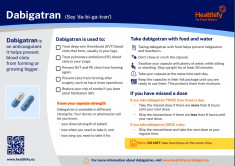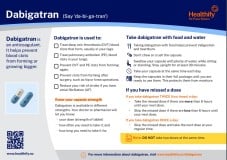You can now add Healthify as a preferred source on Google. Click here to see us when you search Google.
Dabigatran
Sounds like 'da-be-ga-tran'
Key points about dabigatran
- Dabigatran is used to prevent blood clots from forming and stop existing clots from growing bigger.
- It’s used for conditions including deep vein thrombosis (DVT), pulmonary embolism (PE) and atrial fibrillation (to prevent stroke). It’s also used to prevent DVT and PE after hip or knee surgery.
- Dabigatran is also called Pradaxa.
- Find out how to take it safely and possible side effects

Dabigatran belongs to a group of medicines called anticoagulants. Anticoagulants work by interrupting the clot-forming process and increasing the time it takes for blood clots to form. This helps prevent blood clots from forming and stops existing clots from growing bigger. Read more about anticoagulants.
When is dabigatran used?
- For people with atrial fibrillation, because atrial fibrillation increases the risk of stroke. A stroke happens when a blood clot forms in your heart and travels to your brain (usually due to an irregular heart rhythm known as atrial fibrillation).
- After hip or knee surgery when your risk of blood clots is increased.
- To treat and prevent recurrent deep vein thrombosis (DVT) or pulmonary embolism (PE). Read more about DVT and pulmonary embolism.
Factsheets: How to take dabigatran
|
Dabigatran for atrial fibrillation factsheet Healthify He Puna Waiora, NZ, 2020 English [PDF, 231 KB], te reo Māori [PDF, 444 KB], Samoan [PDF, 354 KB], Tongan [PDF, 396 KB] |
Healthify He Puna Waiora, NZ, 2024
|
Video: Dabigatran for use in Atrial Fibrillation
(Bay of Plenty DHB, NZ)
In Aotearoa New Zealand dabigatran comes as capsules which are available in different strengths: 75 mg, 110 mg and 150 mg.
- Always take your dabigatran exactly as your healthcare provider has told you. The pharmacy label will tell you how much dabigatran to take, how often to take it and any special instructions.
- Your dose of dabigatran will depend on what it's being used for.
- Your healthcare provider or pharmacist will tell you the strength that's right for you.
- How long you will need to take dabigatran for will depend on why you're taking it. Some people only need it for a few weeks (eg, after surgery), or for a few months (eg, for deep vein thrombosis). Others may need to take it for the rest of their lives (people with atrial fibrillation).
- Know your capsule strength: Dabigatran capsules are available in different strengths: 75 mg, 110 mg and 150 mg. If you're unsure which capsule strength you're taking, ask your pharmacist.
- Timing: Take your dabigatran dose at the same times each day. You can take dabigatran with or without food.
Swallow the capsules whole with a large glass of water
- It's important to drink enough water so the capsule doesn't get stuck in your throat.
- Don't crush, chew or open the capsules, or sprinkle the pellets on food or mix with liquids. This will release all the medication at once and increase the risk of side effects.
Missed dose
Missing doses increases your risk of getting blood clots. If you forget to take a dose, don't take a double dose – this increases your risk of bleeding.
- Stroke prevention or blood clots: If the next dose is less than 6 hours away, skip the missed dose and take your next dose as normal. If there are more than 6 hours until the next dose, take the missed dose as soon as you remember. Do not take 2 doses at the same time.
- Knee or hip replacement: Skip the missed dose and take your next as normal at the same time the next day. Do not take 2 doses at the same time.
Storing your dabigatran capsules
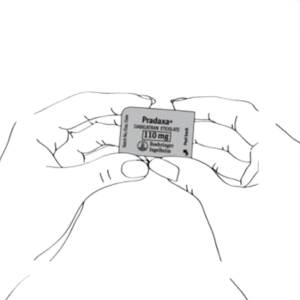
Dabigatran capsules must be kept in the original foil package to protect them from moisture.
- If you store your capsules in a pill box or medication reminder box that you fill yourself, keep them in the foil packaging. Only remove them from the foil packaging when you're ready to take them.
- If you have your medicines packed into compliance aids by a pharmacy (eg, blister packs such as Medico Pak), or into sachets, then these can be kept for up to 8 weeks at room temperature. Make sure you store them in a cool, dry place away from sunlight and moisture.
Image credit: Medsafe
When taking dabigatran, it's important to use the medicine safely and correctly. The benefits of dabigatran need to be carefully balanced with possible side effects. Not enough anticoagulation can lead to a blood clot or stroke, but too much anticoagulation can lead to serious bleeding.
Here are some things to know when you're taking dabigatran. Other things may be important as well, so ask your healthcare provider what you should know about.
You might bleed or bruise more easily while you're taking dabigatran
- Be careful when shaving, clipping fingernails, brushing and flossing your teeth, or playing sports.
- Avoid new tattoos and piercings as these can cause bruising and bleeding.
- If you have a fall or hurt your head or body, get medical attention immediately, even if you feel okay.
- Some types of bleeding are more serious than others. If bleeding concerns you, is heavier than usual or takes an unusually long time to stop, you should talk to your healthcare provider quickly.
Other things to be aware of
- Tell all healthcare providers that you're taking dabigatran (eg, your doctor, dentist, pharmacist or podiatrist). You may need to stop taking your anticoagulant before surgery, dental care and some tests.
- Taking other medicines: Dabigatran can interact with some medicines and herbal supplements, so check with your healthcare provider or pharmacist before starting dabigatran and before starting any new products. This includes over-the-counter anti-inflammatories including diclofenac (eg, Voltaren Rapid), ibuprofen (eg, Nurofen) and naproxen (eg, Naprogesic).
- Pregnancy: Dabigatran isn’t given to pregnant women. If you're taking it and could become pregnant, talk to your healthcare provider about contraception. If you're on dabigatran and find out you're pregnant (or you're planning a pregnancy) talk to your healthcare provider or anticoagulant clinic about stopping or changing your prescription.
Like all medicines, dabigatran can cause side effects, although not everyone gets them. If you're concerned about any symptoms you think might be related to your medicine, talk to your healthcare provider. The following information offers some guidance but doesn't include all possible side effects.
Common side effects
Tell your healthcare provider if these bother you.
- Nausea (feeling sick).
- Indigestion, tummy cramps.
- Headache.
Tell your healthcare provider immediately or phone Healthline free on 0800 611 116 if these occur
- Signs of bleeding, such as unexpected bruises, bleeding gums or nosebleeds.
- For women, if you notice heavier bleeding during your period than before starting dabigatran, continue your dabigatran and see your healthcare provider as there are ways to manage heavy periods.
Phone 111 for an ambulance or go to your nearest accident and emergency (A&E) clinic if these occur
- You have difficulty breathing or pain in your chest.
- You have pain or swelling in your legs.
- You have symptoms of a stroke such as face drooping, arm weakness, speech difficulty, confusion, trouble seeing, trouble walking.
- You've had a serious fall or injury to your head.
- Signs of severe bleeding such as coughing up blood or vomiting blood or there is blood in your urine (wee) or bowel motion (poo).
- You have bleeding that won’t stop after 10 minutes of applying pressure.
Read more about medicines and side effects and reporting a reaction that you think might be a side effect.
Find out what to do if you think a child or someone else has taken a medicine that's not for them.
The following links have more information on dabigatran:
Dabigatran(external link) (te reo Māori(external link)) New Zealand Formulary Patient Information
Pradaxa(external link) Medsafe Consumer Information Sheet
Brochures
Dabigatran (atrial fibrillation) factsheet [PDF, 231 KB] Healthify He Puna Waiora and PHARMAC, NZ English [PDF, 231 KB], te reo Māori [PDF, 444 KB], Samoan [PDF, 354 KB], Tongan [PDF, 396 KB], Chinese (simplified) [PDF, 646 KB], Chinese (traditional) [PDF, 678 KB], Cook Islands Māori [PDF, 358 KB], Hindi [PDF, 398 KB], Korean [PDF, 541 KB]
Dabigatran factsheet [PDF, 208 KB] Healthify He Puna Waiora, NZ
References
- The safe and effective use of dabigatran and warfarin in primary care(external link) BPAC, NZ, 2017
- An update on managing patients with atrial fibrillation(external link) BPAC, NZ, 2017
- Dabigatran etexilate(external link) New Zealand Formulary
- Dabigatran etexilate in compliance aids(external link) Christchurch Medicine Information Service, NZ, March 2025
Brochures
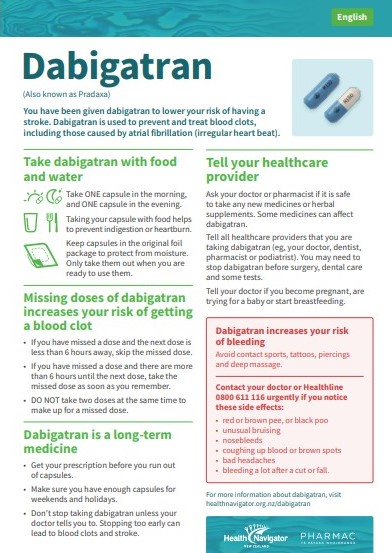
Healthify He Puna Waiora and PHARMAC, NZ, 2020
English, te reo Māori, Samoan, Tongan, Chinese (simplified), Chinese (traditional), Cook Islands Māori, Hindi, Korean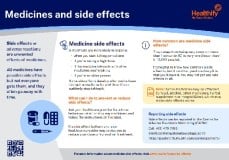
Medicines and side effects
Healthify He Puna Waiora, NZ, 2024
Credits: Sandra Ponen, Pharmacist, Healthify He Puna Waiora. Healthify is brought to you by Health Navigator Charitable Trust.
Reviewed by: Angela Lambie, Pharmacist, Auckland
Last reviewed:
Page last updated:


